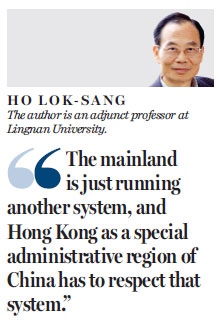The mainland shares and respects the universal values we all cherish
Updated: 2016-05-10 08:26
By Ho Lok-sang(HK Edition)
|
|||||||
There certainly are universal values shared by all humanity. Notwithstanding the diversity of cultures and ethnicities and languages, novels in any language at any time and from any corner of the world can be translated into any other language and still generate resonance and touch emotions all the same. This testifies to the universality of human nature. As human beings, we all cherish love, peace, respect, dignity and freedom. As individuals, we all want autonomy and dislike servitude. We all salute those who make huge sacrifices for the benefit of others, and despise those who willfully cause suffering to others in order to feed their lust for wealth and power.
Thus, there certainly exist universal values that we all share, regardless of nationality and race. Pursuing these universal values and building a world where these values are upheld is the "One Dream" we want to realize in this "One World". This happened to be the theme of the 2008 Beijing Olympics song.
Unfortunately, today many people have mixed up the means with the ends. Some people think that democracy in the sense in which Western nations define it is a universal value. But whereas what motivated the evolution of Western democracy does represent universal values, Western democracy, in the sense of adversarial, multi-party democracy, does not. Adversarial democracy, in particular multi-party democracy, is only one human experiment, which may or may not bring humanity closer to the values that we all pursue. We need to accept that multi-party politics is only a means, and not necessarily the best means, to our common ends.
Unfortunately, one aspect of human nature is that humanity is not above having biases or flawed perceptions. Magicians can play into our flawed perceptions so well that no one can tell how they do certain tricks. Experiments readily demonstrate the common flaws in our perceptions. We need to admit that critical thinking is a rarity. Politicians able to draw votes because their electioneering skills are superior need not make good political leaders. Slogans can be enticing; substance, by contrast, may be difficult to communicate. That is why we need to respect the freedom of nations to experiment with different ways of choosing their political leaders. Humanity will benefit when we learn the lessons from the different experiments.
Unfortunately, apart from flawed perceptions, human nature is subject to many other weaknesses. Too many people mistake the means for the ends; and too many people seek democracy while dictating their wishes to others. Many young people supported the "Occupy Central" movement because they believe that the central government will not give them the political reforms they want because China is not a democratic country in the way they understand it to be. But China certainly shares the same universal values as the rest of humanity. The Chinese leaders no doubt are chosen in a way different from the way Western leaders are elected, but they are working hard to serve the country all the same. There is no evidence at all that they are less competent than the leaders in Western nations. The mainland is just running another system, and Hong Kong as a special administrative region of China has to respect that system. The Aug 31, 2014 decree handed down by the Standing Committee of the National People's Congress was certainly fair. It was done in order to ensure that the Chief Executive elected by universal suffrage in Hong Kong will respect the mainland's political system and will not challenge the authority of the central government.
Sadly, many young people did not understand this. Just because China is running another system, and not the Western multi-party system, they feel they should defy anything that comes from the central government as if it was meant to dictate Hong Kong people's lives. But the performance of the Chinese leaders, judged by the advances China has made in the various areas monitored by the Human Development Index (HDI), has actually been outstanding. The HDI is an objective indicator of how China is doing in achieving advances against criteria defined by the United Nations. Although the indicator is not all-inclusive, it nevertheless shows China not only shares the universal values that are so dear to us, but also is performing pretty well.
Thus it is tragic to see how some of our young people err. In defiance of the central government's Aug 31 decree, some of them have organized themselves to seek independence from China. Many commentators writing for this paper and elsewhere have already pointed out how foolish this is. This is because such activity will only undermine Hong Kong's attraction as a destination for foreign direct investment and as an international financial center. The purpose of this article is to invite our young people to objectively look at modern China as a nation offering an alternative model of governance and of transition of leadership that is different from what is practiced in the West. This much is clear: There is leadership rotation on the mainland; leadership is selected through a rigorous system of vetting to assess candidates' merit; and China is working hard to combat corruption. China shares and respects the universal values that we all cherish.

(HK Edition 05/10/2016 page10)